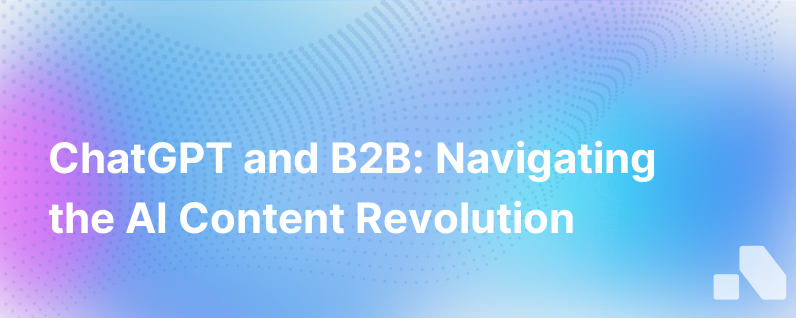
In an ever-evolving digital landscape, Artificial Intelligence has become an essential tool for businesses looking to stay competitive. Among AI's various applications is content generation, where platforms like ChatGPT herald what's being called the AI Content Revolution. This advancement holds special significance for B2B businesses keen on leveraging technology to enhance their content marketing strategies.
Understanding ChatGPT and the AI Content Revolution
ChatGPT is a state-of-the-art language model developed by OpenAI, built to understand and generate human-like text. It is the output of a cutting-edge neural network architecture called GPT (Generative Pre-trained Transformer), designed to comprehend context, answer questions, write essays, and even create poetry that is often indistinguishable from content written by humans.
The AI Content Revolution refers to the transformative impact AI tools like ChatGPT have on content creation across multiple domains, from news articles to marketing materials and beyond. The essence of this revolution is deploying AI to produce high-quality, relevant content at scale and speed unattainable by humans alone.
Implications for B2B Content Marketing
As B2B businesses navigate complex sales cycles and communication with informed buyers, the need for authoritative, insightful content has never been greater. Here are several ways B2B marketers can harness the AI Content Revolution:
1. Enhanced Efficiency and Scalability
AI-driven tools can generate drafts, brainstorm ideas, and conduct language translations with ease, reducing the time human writers spend on routine tasks. This increases the ability of B2B companies to scale their content production without compromising quality.
2. Improved Personalization
ChatGPT's advanced language model enables it to generate content tailored to specific industries, job roles, or business challenges. This tailor-made approach allows B2B marketers to create more personalized communications, resonating with target audiences.
3. SEO and Keyword Integration
AI tools can integrate relevant keywords seamlessly into content, optimizing it for search engines and ensuring that the material ranks well on search engine results pages (SERPs). B2B businesses need to appear in the top search results for industry-relevant queries, and AI can help them achieve that.
4. Competitive Intelligence
ChatGPT and similar models can be used to analyze masses of text data from competitor publications, market research, and social media dialogues, extracting insights that can inform content strategy, positioning, and competitive differentiation.
5. Data-Driven Decision Making
AI models are great at organizing and interpreting data, which B2B businesses can leverage to inform their content strategy. From identifying trending topics to analyzing content performance, AI provides data-driven insights that guide smarter content decisions.
6. Automation of Routine Communication
Common customer queries, FAQ responses, and even initial drafts of complex reports can be automated using AI, freeing up marketing and sales teams to focus on more strategic, high-value interactions with prospects and clients.
7. Ideation and Creative Strategy
AI models like ChatGPT can generate a plethora of content ideas and outlines, streamlining the creative process and helping content teams overcome writer's block or fresh perspective slumps.
Challenges to Consider
While the AI Content Revolution offers tremendous advantages, it's not without challenges. Businesses must be mindful of:
Authenticity and Voice Consistency
Maintaining a unique and authentic brand voice is crucial in B2B marketing. AI-generated content often needs fine-tuning to align with a company's tone and messaging.
Content Verification
As intelligent as ChatGPT may be, it's not infallible. B2B businesses must closely scrutinize AI-generated content for accuracy, especially regarding facts, figures, and industry-specific information.
Regulatory Compliance
B2B companies, especially in healthcare, finance, and legal sectors, need to ensure that all generated content complies with industry-specific regulations. There's a need for human oversight to navigate the complex compliance landscape.
Ethical and Moral Implications
The use of AI in content creation raises ethical questions about transparency and the potential displacement of human jobs. Businesses must articulate clear ethical policies on AI use to their stakeholders.
How B2B Businesses Can Prepare
Given the potential of AI in revolutionizing content creation for B2B marketing, there are steps businesses can take to prepare:
- Invest in AI Capabilities: Start with pilot projects that leverage AI for content creation to understand its capabilities and limitations.
- Train Your Teams: Ensure your marketing, sales, and content teams are trained to work alongside AI tools.
- Develop a Content Strategy: Incorporate AI into your content strategy to align with business objectives, audience needs, and SEO requirements.
- Creating Robust Guidelines: Define guidelines for AI-generated content, focusing on brand voice, style, and regulatory compliance.
- Embrace Experimentation: Test different content types that AI can assist with and gauge the response from prospects and customers.
- Prioritize Human Oversight: Maintain a strong editing and review process to ensure the quality and accuracy of AI-generated content.
Conclusion
The AI Content Revolution, as embodied by ChatGPT, carries both promise and challenge for B2B businesses. By harnessing the strengths of AI while strategically mitigating its limitations through human expertise, B2B companies can enjoy an unprecedented chance to lift their content marketing to new heights of effectiveness and innovation. The future is here, and it's one where AI and human ingenuity combined redefine the realm of possibilities for content creation in the B2B space.